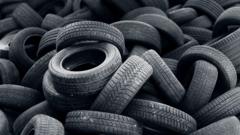Are New Regulations Enough to Prevent Used Tyres from Going to Furnaces?

Enhanced Checks on Tyre Exports: A Necessary Step for Environmental Protection
The recent announcement by the Environment Agency (EA) regarding enhanced checks on the export of tyres from the UK has sparked significant discussions on environmental safety and waste management. With millions of tyres reportedly being sent to illegal furnaces instead of being properly recycled, the need for stringent regulations has never been more pressing. This article delves into the implications of this new policy, the ongoing challenges in tyre recycling, and why it is crucial for both ecological health and public safety.
The Scope of the Tyre Waste Problem
The UK generates approximately 50 million waste tyres annually, which translates to nearly 700,000 tonnes. Alarmingly, about half of these tyres are exported to countries like India under the pretext of recycling. However, investigations have revealed that a staggering 70% of these exported tyres are being processed in makeshift industrial plants, where they undergo pyrolysis. This method is intended to extract valuable materials such as carbon black, steel, and oil, but it comes at a significant cost to both health and the environment.
Pyrolysis: The Dark Side of Tyre Recycling
Pyrolysis is a process that involves heating waste materials to high temperatures in an oxygen-free environment, breaking them down into simpler compounds. While it might seem like a viable recycling method, the reality is that many of these facilities operate without proper safety measures or environmental regulations. The result? Toxic emissions, polluted water sources, and serious health issues for local communities.
Health and Environmental Risks
The consequences of these illegal operations are dire. Reports have shown that communities near these makeshift plants suffer from health problems such as respiratory issues and skin diseases. An explosion in January that killed two women and two children in Maharashtra serves as a tragic reminder of the dangers posed by poorly regulated pyrolysis plants. Such incidents highlight the urgent need for better oversight and more stringent regulations to protect both human lives and the environment.
The Environment Agency's Response
In light of the BBC's investigation, the EA has launched a review and acknowledged the likelihood that a portion of exported tyres is being diverted to illegal operations. The agency has committed to introducing enhanced checks on tyre exports, effective October 1. Exporters will now be required to demonstrate that their waste is being recovered in an environmentally sound manner.
What Will Change?
Under the new regulations, exporters must provide credible evidence that the tyres are being processed properly and that they are not ending up in illegal facilities. However, some critics argue that the EA's approach may not be sufficient to close all loopholes exploited by criminals. The pressure group Fighting Dirty expressed concerns that the plan may only result in more paperwork without effective enforcement.
The Tyre Recycling Association's Stance
The Tyre Recycling Association (TRA) has long advocated for a complete ban on the export of whole tyres. They argue that shredding tyres before export would significantly reduce the risk of illegal sales in countries like India. Despite their disappointment with the EA's dismissal of this approach, the TRA continues to push for stronger regulations to ensure that tyres are processed responsibly.
Why a Ban on Whole Tyre Exports Might Be Necessary
- Prevention of Illegal Practices: A ban could deter criminal enterprises from exploiting loopholes in the current system.
- Improved Safety: Shredded tyres are less likely to be processed in unsafe conditions.
- Environmental Integrity: Ensuring that tyres are recycled in facilities that meet stringent standards can protect ecosystems.
The Pragmatic Solution: Balancing Export and Environmental Responsibility
The EA describes the new regulations as a "pragmatic solution" that allows for continued exports while ensuring that exported tyres are sent to facilities with standards comparable to those in the UK. However, the effectiveness of these regulations remains to be seen. Critics worry that without strict enforcement and monitoring, the problem of illegal tyre processing will persist.
Steps Towards Improvement
To enhance the effectiveness of the new regulations and ensure that tyre exports are handled responsibly, several steps can be taken:
- Regular Audits: Implementing regular audits of exporting companies can help verify compliance with environmental standards.
- Collaboration with International Bodies: Working alongside international environmental organizations could improve monitoring efforts.
- Public Awareness Campaigns: Raising awareness about the importance of responsible tyre disposal can encourage better practices among consumers and businesses alike.
Conclusion: A Call to Action
The introduction of enhanced checks on tyre exports is a crucial step towards addressing the environmental and health risks associated with illegal pyrolysis operations. However, it is imperative that these regulations are enforced effectively to ensure meaningful change. As individuals, businesses, and communities, we must advocate for responsible waste management practices and support policies that protect our environment. The question remains: how can we collectively work towards a sustainable future for tyre recycling?
FAQs
What are the health risks associated with illegal tyre processing?
The health risks include respiratory issues, skin diseases, and exposure to toxic emissions from poorly managed pyrolysis plants.
How many tyres does the UK export for recycling annually?
The UK exports approximately 25 million tyres annually, which is about half of its total waste tyre generation.
What practices can help improve tyre recycling?
Practices such as shredding tyres before export, regular audits of recycling facilities, and public awareness campaigns can improve tyre recycling efforts.
As we move forward, it is essential for all stakeholders to work together to create effective solutions for tyre recycling. What steps do you think should be taken to ensure responsible waste management? #TyreRecycling #Sustainability #EnvironmentalHealth
```Published: 2025-08-07 05:09:03 | Category: technology



